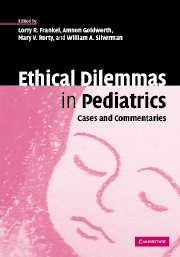Book contents
- Frontmatter
- Contents
- List of contributors
- Preface
- Introduction
- Part I Therapeutic misalliances
- 1.1 Unconventional medicine in the pediatric intensive care unit
- 1.2 Role responsibility in pediatrics: appeasing or transforming parental demands?
- 1.3 Topical discussion
- 2.1 The extremely premature infant at the crossroads
- 2.2 The extremely premature infant at the crossroads: ethical and legal considerations
- 2.3 Topical discussion
- 3.1 Munchausen syndrome by proxy
- 3.2 Some conceptual and ethical issues in Munchausen syndrome by proxy
- 3.3 Topical discussion
- Part II Medical futility
- Part III Life by any means
- Part IV Institutional impediments to ethical action
- References
- Index
- References
2.3 - Topical discussion
Published online by Cambridge University Press: 18 August 2009
- Frontmatter
- Contents
- List of contributors
- Preface
- Introduction
- Part I Therapeutic misalliances
- 1.1 Unconventional medicine in the pediatric intensive care unit
- 1.2 Role responsibility in pediatrics: appeasing or transforming parental demands?
- 1.3 Topical discussion
- 2.1 The extremely premature infant at the crossroads
- 2.2 The extremely premature infant at the crossroads: ethical and legal considerations
- 2.3 Topical discussion
- 3.1 Munchausen syndrome by proxy
- 3.2 Some conceptual and ethical issues in Munchausen syndrome by proxy
- 3.3 Topical discussion
- Part II Medical futility
- Part III Life by any means
- Part IV Institutional impediments to ethical action
- References
- Index
- References
Summary
The paradoxical neonate
The treatment of the extremely low-birth-weight baby, as in this case, is as challenging ethically as it is medically. A fragile baby able to fit in the palm of a hand can have remarkable reparative and adaptive potential, but short-term (and long-term) morbidity is unknowable. The parameter of “viability” is itself a moving target: it shifts downward with new technologies or treatment modalities, and varies among institutions as well as among infants. The difference of one week of gestational development can, as in this case, alter expectations for the medical course of a newborn.
For infants born at a gestational age of 26 or more weeks, or weighing more than 800 g, treatment is the standard of care. There is some consensus that for an infant of less than 23 weeks or 500 g at birth, the presumption should be against resuscitation. This recommendation, based on empirical results in such cases, is like the writing on ancient mariner's maps warning “here be dragons.” It is all very well to be told not to go there – but, as in this case, you may find yourself there anyway.
Acting for the best in the face of uncertainty
Despite the availability of statistical compilations of complications of prematurity, the long-term results of any short-term intervention can be unpredictable for any given infant. For the extremely low-birth-weight baby, there is, in addition, a vulnerability that is based on the fact that the neonate is uniquely individual and resistant to classification.
- Type
- Chapter
- Information
- Ethical Dilemmas in PediatricsCases and Commentaries, pp. 52 - 54Publisher: Cambridge University PressPrint publication year: 2005



